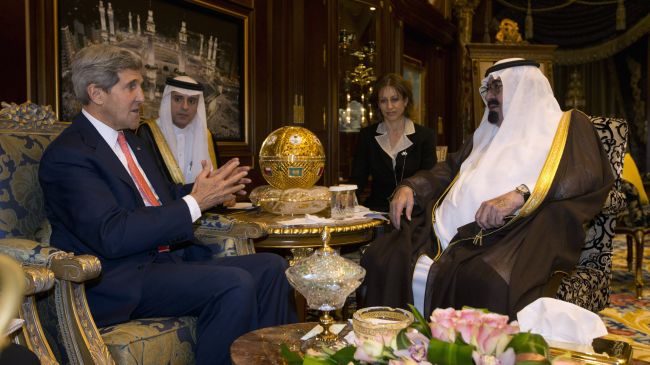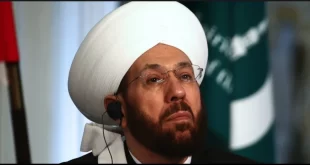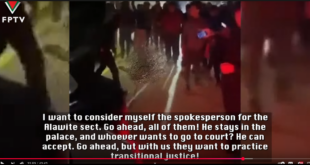
Nov 4, 2013, Press TV
But the American secretary of state came clean this week – no doubt by accident – when he confirmed to media that recent policy rows between the US and Saudi Arabia’s ruling House of Saud are merely on the basis of “tactical” differences. The fundamental policy goals, that is, the strategy, remain the same, Kerry admitted.
Kerry was referring to Syria. But what he said applies equally to recent tensions between the US and Israel over Iran.
The American diplomat was speaking in the Saudi capital, Riyadh, at the start of a busy regional tour. It is transparent even from Western mainstream media headlines that the urgent purpose of Kerry’s 11-day mission is to patch up frayed relations with US client regimes, in particular, Saudi Arabia and Israel, rather than pursuing some higher, noble goal, such as peace in the region – as might befit a supposed leader of democracy and human rights.
Both the Saudi and Israeli regimes have been glowering and huffing and puffing in recent weeks because of Washington’s apparent “weakness” towards Syria and Iran. This has led some commentators to speculate that Washington is undergoing a fundamental shift away from the usual militarist aggression towards the alliance between Damascus and Tehran.
This aggression fully drives the Saudi- and Israeli-backed covert war in Syria and the illegal blockade on Iran through Western sanctions. Because Washington baulked at launching an overt criminal war on Syria while also embarking on a new diplomatic thrust with Iran over the nuclear dispute – both of which developments are anathema to the House of Saud and the Zionist regime – this has led to extraordinary tensions within this US-led axis.
But the question is: how significant are these tensions? Could they signal that Washington is preparing to circumvent its historic alliance with Riyadh and Tel Aviv in order to back a political settlement for the two-and-a-half Syrian conflict, as well as the decade-old nuclear confrontation with Iran?
Well, this week John Kerry gave us the answer – No. Kerry spoke of what he called America’s “major defensive relationships” in the Middle East. This is American rhetorical code for “strategic alliance with despotic regimes” to underpin its imperialist hegemony in the region.
“We will be there for Saudi Arabia, for the Emirates, for Qataris, for the Jordanians, for the Egyptians and others. We will not allow those countries to be attacked from outside. We will stand with them,” Kerry told reporters, trying to sound like a knight in shining armor.
The US diplomat’s groveling tone of gratitude to “his majesty” – Saudi King Abdullah – for granting him a meeting in Riyadh should have been enough to demonstrate Washington’s strategic commitment to the House of Saud, and by extension, other Middle East dictators.
But it was the unusually candid words of Kerry uttered to his embassy staff in the Saudi capital that were most revealing.
“Right now we have some very important things to talk about to make certain the Saudi-US relationship is on track, moving forward and doing the things that we need to accomplish.” On the issue of tactics and strategy, Kerry earlier said, “Those differences on individual tactics on policy do not mean a difference on [the] fundamental goal of the policy.” That is a key admission by Kerry, albeit inadvertently. Regarding Syria, the “fundamental goal of policy” is the removal of President Bashar al-Assad. Washington may be officially endorsing the so-called Geneva II political process for Syria, but the bottom line is to impose conditions that warrant Assad to step down.
Thus the Americans want to achieve regime change through political means, while the Saudi rulers are still pushing for the covert military option. The difference is merely tactical, not strategic. That is what Kerry is seeking to achieve on his current tour of Middle East despots and by massaging their fragile egos. It’s a tour to reassure.
To paraphrase Kerry, what he is saying to Saudi King Abdullah, Israel’s Netanyahu, the Qataris, Emiratis, Jordanians and the Egyptian military junta is this: “Please, guys, relax. Uncle Sam still loves you, still wants you. But trust us, we need to change tactics in order to achieve the same objective that we all want.”
In Syria, Washington realizes that the military tactic as a means of regime change has become redundant. This reality was underscored in recent days when Syrian government forces retook the key town of Safira between Damascus and the northern city of Aleppo. The recapture of the town means that foreign-backed militants occupying Aleppo are now cut off from supply routes.
Significantly, the defeat of the militants in Safira was caused in part by feuding among the mercenary groups. The Washington Post reports: “Opposition commanders said Safira fell after Islamist brigades failed to respond to a call for reinforcements by the Tawheed Brigade, Aleppo’s biggest rebel battalion, which was forced to flee under a withering bombardment by the Syrian air force.”
The American government, as well as the British and French, know that the more than two-year military game in Syria is up, owing to a combination of the formidable Syrian army and the splintering, crumbling mercenary proxies.
Washington and its Western allies also know that if they are to have any leverage with the political tactic to exert regime change in Syria, then it is imperative to try to push for the Geneva II talks sooner than later, while the militants still retain some territory.
The longer the conflict drags on, the less leverage the West will have at any eventual political negotiations because the Western-backed insurgents will have been routed and Assad will have no reason to compromise.
The difference, though, with Saudi Arabia is that the House of Saud does not realize that the tactics of the game need to change. The Saudis are still plodding on sponsoring the losing military tactic. The Saudis do not seem to realize that the Americans have not given up on the covert war objective. Its aim to get rid of Assad still remains, but henceforth it is to be through political maneuvering.
That’s what Kerry was in Riyadh for this week, to reassure the American House of Saud puppets that fundamentally nothing has changed.
Moreover, the underlying strategic hostility towards Syria also applies to Iran, and Kerry let the Saudi rulers know that too.
We can be sure that the American diplomat will likewise soothe Washington’s Israeli clients similarly in regard to its diplomacy with Iran. The recent reiteration by American officials, such as nuclear negotiator Wendy Sherman, that US sanctions would not be lifted “any time soon” on Iran also indicates that Washington is more guided by tactical concerns than any fundamental change in policy, such as normalization of Iranian relations.
 Syria Support Movement solidarity with the Syrian people
Syria Support Movement solidarity with the Syrian people




